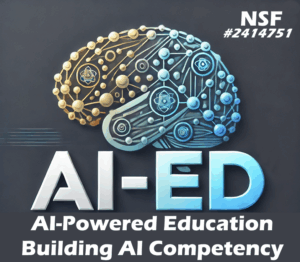Using AI to Improve Education | Workshop | Participants | Apply
BPE-Track 2: Modernizing Education: Using AI to Improve
Students’ Learning and Build Skills for the Future
 NSF Grant #2414751 (NSF Link): Aug 2024 – Aug 2027
NSF Grant #2414751 (NSF Link): Aug 2024 – Aug 2027
Ibrahim Zeid (P.I.) & Claire Duggan (Co-P.I.) & Jennifer Love (Sr. Personnel)
The broader impact of this Broadening Participation for Engineering Track-2 (BPE-Track-2) proposal addresses the critical need to enhance AI competency among K-12 educators in STEM fields. As AI technologies rapidly advance, there is a growing demand to prepare students for an AI-driven future. The project is to transform K-12 education by equipping teachers with the knowledge and skills to incorporate AI into their classrooms. The project ensures that students, particularly those underrepresented in STEM, are prepared for an AI-driven future. By providing comprehensive professional development (PD) for teachers, this project fosters a learning community that supports the development and implementation of AI-effective teaching practices. The project enhances classroom teaching and promotes equity in STEM education. It also contributes to a more diverse, technologically proficient, and AI-informed STEM workforce. The project aligns with the National Science Foundation’s mission to promote scientific progress by addressing the growing demand for AI literacy in education. Through the development and dissemination of AI best teaching practices and an innovative AI-focused teacher PD model, this project has the potential to transform high school education on a national scale, aligning with NSF’s mission to advance the nation’s prosperity and maintains its competitive edge in the global economy.
The proposed project will establish a three-year PD program for high school teachers focused on Generative AI in education. Each year, the program will recruit 10 teachers, prioritizing those serving students underrepresented in STEM fields. The project begins with a pre-survey to assess current AI knowledge, followed by introductory modules on AI history. Teachers will then participate in an intensive one-week summer PD session on AI, which will be supplemented by year-long support throughout the academic year, including monthly collaborative meetings and ongoing content delivery. Teachers will collaborate with the project team to develop and implement AI-informed lesson plans in their STEM classrooms. The program employs a hybrid approach, combining direct instruction with the fostering of a learning community across schools and districts. Key activities include monthly collaborative meetings, callback sessions for feedback, and the creation of online tools for nationwide dissemination. The project’s outcomes include a scalable teachers PD model, the creation and implementation of AI-informed lesson plans for use in high school STEM classrooms, and broad dissemination of resources through online platforms. This comprehensive approach aims to cultivate AI competency in education, ultimately preparing the next generation for careers in an AI-driven world.
Read more at News at Northeastern and COE News.
